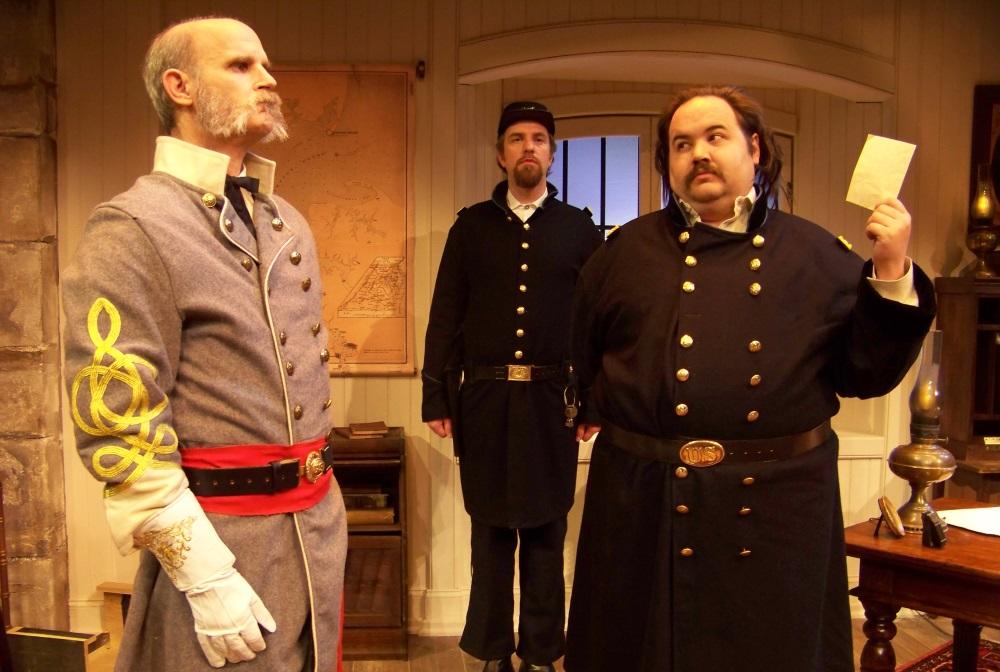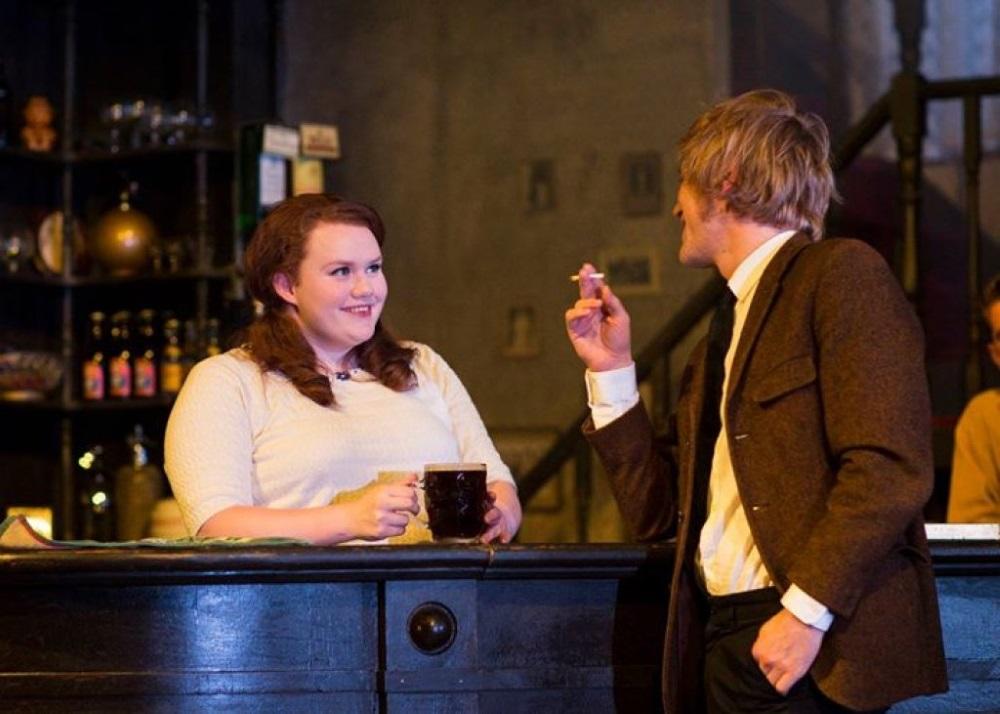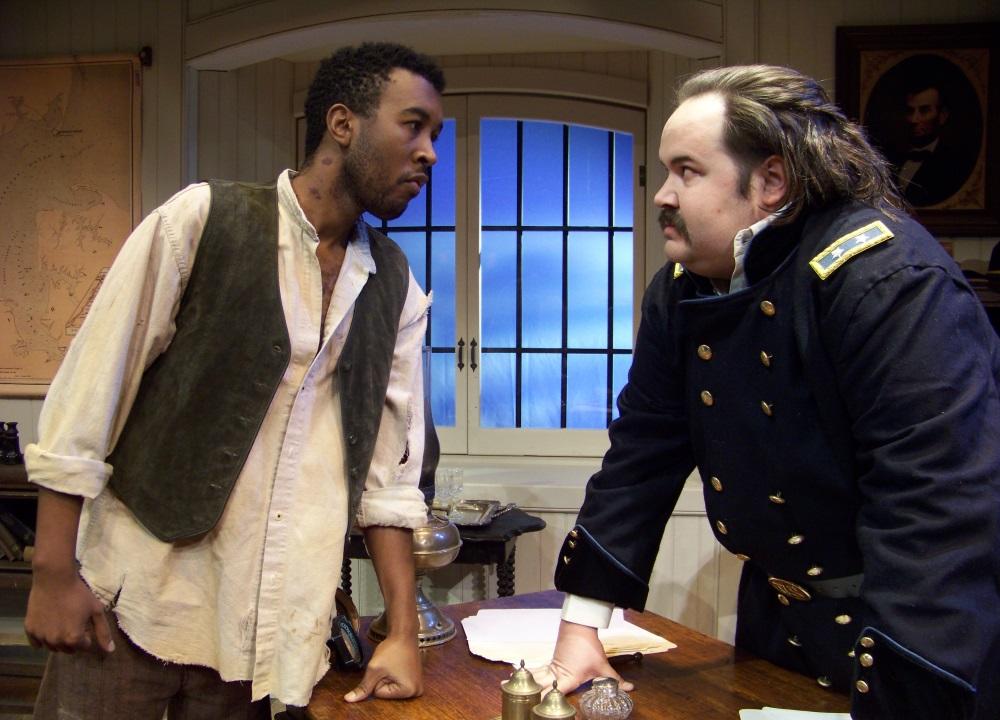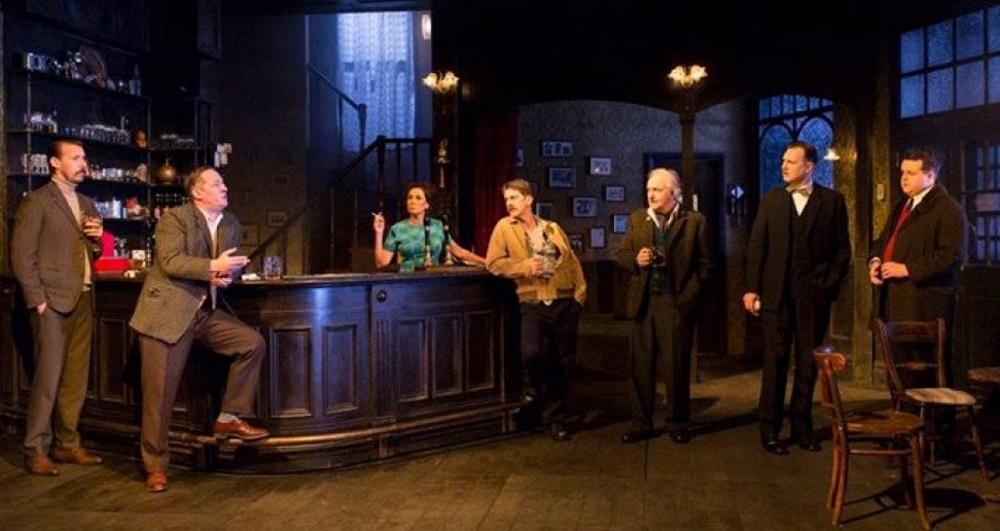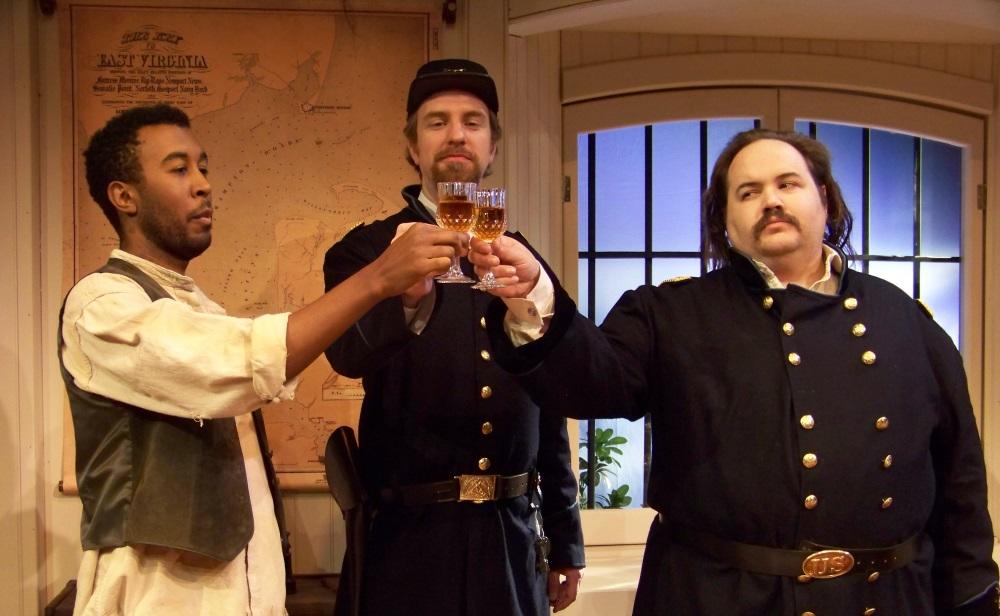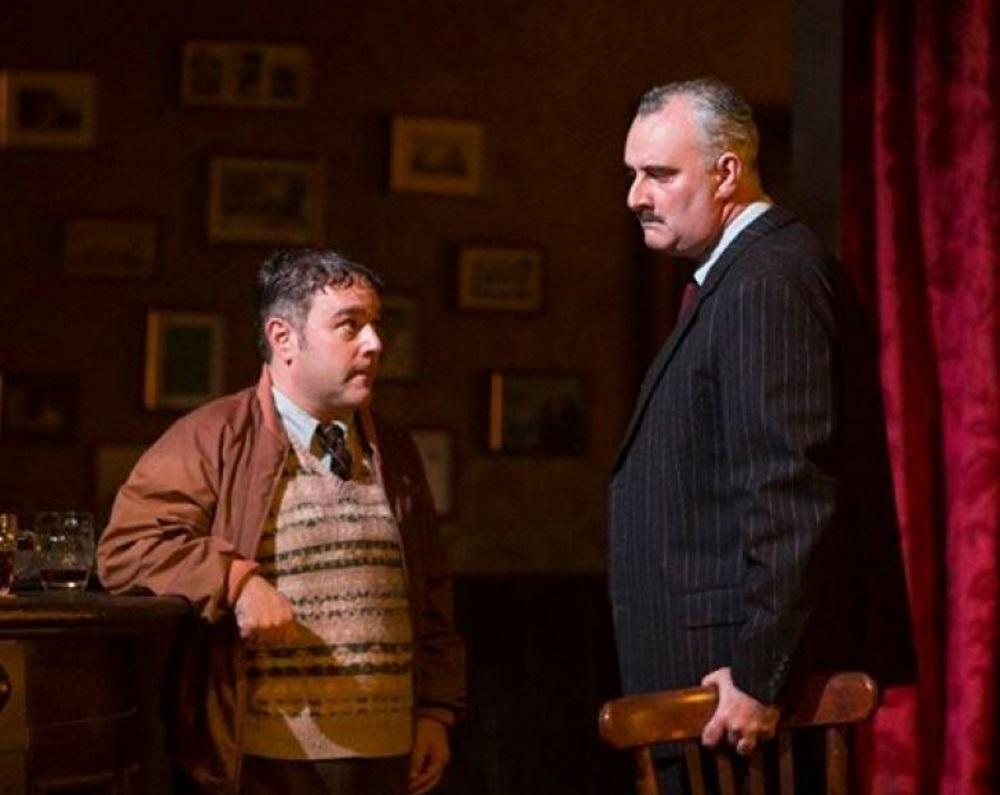There’s a lot of testosterone flowing in this week’s two picks: Butler, an all-male dramedy set during the Civil War, at the Theater Project, and Hangmen, a black comedy-cum-tantalizing whodunit from Britain’s National Theatre. In both of them, men use rank, seniority, guile, and often pure volume to impose their will and, not incidentally, offset their own inadequacies.
In Butler, the bully is the title character, Major General Benjamin Franklin Butler, a Massachusetts lawyer who has been in command of Fort Monroe, Virginia, for less than a month – the same amount of time he’s been an officer in Lincoln’s army. In the opening moments of Richard Strand’s play, he subjects his young adjutant, Lieutenant Kelly, to a fusillade of sarcastic questions and peevish complaints, punctuated regularly with outbursts of (mostly affected) anger.
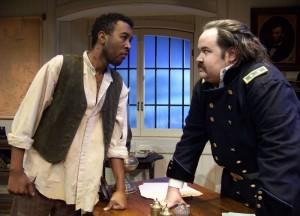 Based on a little-known but decisive incident in the early days of the war – one that changed the terms of “the slavery question” in the conflict and, in some ways, its outcome – the play sets the novice general a life-and-death problem: what to do with an escaped slave who has arrived at the fort. He’s bound by duty and the Fugitive Slave Law to turn the man over to the Confederacy, but pulled by conscience and compassion, which he hides with belligerent bombast.
Based on a little-known but decisive incident in the early days of the war – one that changed the terms of “the slavery question” in the conflict and, in some ways, its outcome – the play sets the novice general a life-and-death problem: what to do with an escaped slave who has arrived at the fort. He’s bound by duty and the Fugitive Slave Law to turn the man over to the Confederacy, but pulled by conscience and compassion, which he hides with belligerent bombast.
The slave is Shepard Mallory, fiercely determined, alarmingly articulate and beyond desperate. He and two of his fellows have fled the Confederate garrison across the river and come to the Union fort seeking – no, demanding – sanctuary. Mallory is just as strong-willed as Butler and, in his own way, just as arrogant (in John G. Williams’ finely tuned performance, his default gaze is down his nose). Butler is a bully, but Mallory will not be bullied – as attested by the scars on his back from previous encounters with authority.
Notwithstanding the play’s title, it’s as much Mallory’s story as Butler’s, and notwithstanding their wildly unequal status, the men are amusingly similar. Both are smart, peremptory, quick to anger, self-assured and self-possessed – qualities that drive their relationship and the play itself. This battle of wits and will is played out in five brief scenes set in Butler’s office (Greg Trochlil’s brick-and-granite setting is at once imposing and claustrophobic).
This is director Joseph Discher’s third outing with this play. He staged its premiere two years ago – with two of the actors who appear in this production – as well as its regional debut at Barrington Stage Company last summer. Here he finds the right balance between tension and humor, just as the play poses lawerly ingenuity against legal imperative.
As Butler, Brian Silliman is appropriately intimidating – and dauntingly rotund – moving nimbly from stern authority to impish irony, but never far from apoplexy. As the Confederate major who comes under a flag of truce to claim his fugitive property, David Sitler is the model of an old-school Southern gentleman: gloved and immaculate, punctiliously polite and doggedly righteous. Tom Dahl’s Lieutenant Kelly is also a newly minted soldier, recently out of West Point, a by-the-book junior officer whose ramrod stance and impassive expression belie a creeping sympathy for the black man under his guard.
Through April 3, Majestic Theater, 131 Elm St., West Springfield, (413) 747-7797, majestictheater.com.
Hangmen is positively teeming with bullies. Most of the men bully each other and anyone who is subordinate to them, giving way only to someone who’s a bigger bully. In a way, the cast’s two women, both of them often on the receiving end, are the strongest of the lot, and ultimately the most pragmatic.
The play is a current hit in London, having transferred to the West End from the Royal Court Theatre, that tireless champion of adventurous new work. It’s by Martin McDonagh, author of blistering black comedies like A Behanding in Spokane (not to mention the purely blistering Pillowman) and best known to cinema audiences for the dark comedy-thriller Bruges. A live satellite performance was broadcast from Wyndham’s Theatre in London earlier this month in the National Theatre Live season, with an encore screening at the Amherst Cinema this Saturday, March 19.
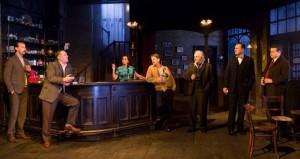 After a prologue in which we witness the execution of a convicted rapist/murderer, who dies protesting his innocence, the play jumps forward three years to a pub in Northern England. It’s the day in 1965 when the death penalty was abolished in Britain and the publican, Harry (David Morrissey), has just lost his job as one of the government’s official hangmen. Arrogant, boastful and domineering, he lords it over the pub’s crowd of midday regulars (including a semi-bent police inspector), browbeating his wife (Sally Rogers), cruelly teasing his fat, shy teenage daughter (Bronwyn James) and endlessly galled that he’s only considered Britain’s second-best hangman.
After a prologue in which we witness the execution of a convicted rapist/murderer, who dies protesting his innocence, the play jumps forward three years to a pub in Northern England. It’s the day in 1965 when the death penalty was abolished in Britain and the publican, Harry (David Morrissey), has just lost his job as one of the government’s official hangmen. Arrogant, boastful and domineering, he lords it over the pub’s crowd of midday regulars (including a semi-bent police inspector), browbeating his wife (Sally Rogers), cruelly teasing his fat, shy teenage daughter (Bronwyn James) and endlessly galled that he’s only considered Britain’s second-best hangman.
Coincidentally (or is it?) the tributes and recriminations that are flowing on this historic but, for Harry, regrettable day are interrupted by two unexpected arrivals. One is a Harry’s erstwhile assistant, Syd (Andy Nyman), who’s nursing doubts about the justice of the hanging we saw at the outset. The other is Peter (Johnny Flynn,) a cocky Cockney with a sly, menacing demeanor, who may or may not be the real perpetrator of those murders.
If various shades of bullying define most of the men’s relations with the world around them, the motivating force seems to be core terror: a deep insecurity and a dread of truly showing themselves, masked by a rigid public façade – much as General Butler hides his military inexperience behind bluff and bluster. Indeed, in Hangmen we get the impression we’re watching a macho game of blind man’s bluff, a bit too symbolically mirrored by the old barfly who’s dreamy and half-deaf but “sees” what’s really going on. The dialogue has a kind of Pinteresque rhythm, people talking around each other instead of with each other, using speech as a weapon, not for connection but self-protection.
Director Matthew Dunster deftly handles the playwright’s switchback turns, from anarchic humor to chilling disquiet to ultimate violence. The cast is flawless, as we’ve come to expect from the NT Live series (though it might take your ear a few beats to pick up on the northern dialect) and Anna Fleischle’s set is a meticulous recreation of a grimy, dark (too dark at times) working-class pub.
Butler photos by Lee Chambers
Hangmen photos by Helen Maybanks
If you’d like to be notified of future posts, email StageStruck@crocker.com

